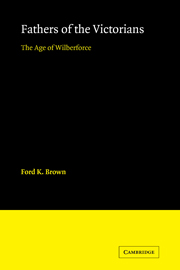Book contents
- Frontmatter
- Contents
- Dedication
- Foreword
- PART I WAR ON THE GENTILE WORLD
- PART II LABOURING FOR THE SPIRITUAL IMPROVEMENT OF OTHERS
- 6 Gangrening the Principles of the Country
- 7 Missionaries to England
- 8 The Crisis at Cambridge
- 9 Ten Thousand Compassions and Charities
- PART III ENGLAND IN DANGER
- Bibliography
- Index
8 - The Crisis at Cambridge
Published online by Cambridge University Press: 11 March 2010
- Frontmatter
- Contents
- Dedication
- Foreword
- PART I WAR ON THE GENTILE WORLD
- PART II LABOURING FOR THE SPIRITUAL IMPROVEMENT OF OTHERS
- 6 Gangrening the Principles of the Country
- 7 Missionaries to England
- 8 The Crisis at Cambridge
- 9 Ten Thousand Compassions and Charities
- PART III ENGLAND IN DANGER
- Bibliography
- Index
Summary
The titled members of the Bible Society's auxiliaries were not actually unnumbered, neither were the editions of the Bible though many, and the bishops did not keep coming in one by one. Beyond those understandable inaccuracies of the Society's historian the estabhshment of the auxiliary at Cambridge points to another. It could be described in many ways, but not as spontaneous and unpremeditated. Probably many, and perhaps most, of the Society's branches in small communities were begun in the face of the kind of active hostility met at Cambridge in 1811. This valuable episode, set off by some rashly zealous Evangelical juniors, lacks the violence and unbridled hatred of the Blagdon Controversy, but it has passion, intrigue and a general richness of its own. If unfortunately its cast has no tragic-comic character of the stature of Hannah More, in taking us to the second capital of Evangelicalism it introduces some noteworthy new ‘emissaries’ and new champions, strong figures of the larger struggle that the University of Cambridge contributed to the Puritan cause as it had done in the sixteenth and seventeenth centuries.
Earlier in the year, Wilberforce shared in repulsing a second parliamentary attack on Evangelicalism, the details of which as given in his sons' Life are more puzzling than those of Tomline's attack of 1798–1800. Henry Addington, Lord Sidmouth, had not so far taken an open part in the fight against the truth, though down in Somerset his step-half-brother Hiley Addington, Mrs More's neighbour, was opposed to it in the Blagdon Controversy, and Sidmouth's Orthodox adherence was known.
- Type
- Chapter
- Information
- Fathers of the VictoriansThe Age of Wilberforce, pp. 285 - 316Publisher: Cambridge University PressPrint publication year: 1961



